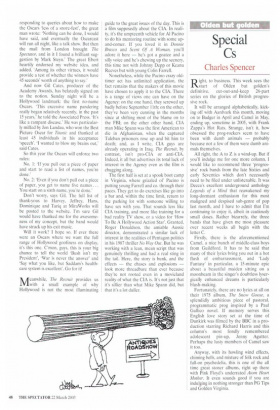Special Cs
Charles Spencer
Right, to business. This week sees the IN..start of Olden but golden's definitive, cut-out-and-keep 26-part series on the glories of British progressive rock.
It will be arranged alphabetically, kicking off with Aardvark this month, moving on to Badger in April and Camel in May, ending up, sometime in 2005, with Frank Zappa's Hot Rats. Strange, isn't it, how obsessed the prog-rockers seem to have been with dumb animals — probably because not a few of them were dumb animals themselves.
All right, the A to Z is a wind-up. But if you'll indulge me for one more column. I would like to recommend three 'progressive' rock bands from the late Sixties and early Seventies which don't necessarily need to be filed under unlistenable. It was Decca's excellent underground anthology Legends of a Mind that reawakened my long-dormant enthusiasm for this most maligned and despised sub-genre of pop last month, and I have to admit that I'm continuing to enjoy it, albeit in cautiously small doses. Rather bizarrely, the three bands that have given me most pleasure over recent weeks all begin with the letter C.
Firstly, there is the aforementioned Camel, a nice bunch of middle-class boys from Guildford. It has to be said that many of their lyrics bring you out in a hot flush of embarrassment, and 'Lady Fantasy' in particular, a 15-minute epic about a beautiful maiden sitting on a moonbeam in the singer's doubtless lysergically enhanced dreams is particularly blush-making.
Fortunately, there are no lyrics at all on their 1975 album, The Snow Goose, a splendidly ambitious piece of pastoral, programmatic prog inspired by a Paul Gallico novel. If memory serves this English love story set at the time of Dunkirk was filmed by the BBC in a production starring Richard Harris and this column's most fondly remembered adolescent pin-up, Jenny Agutter. Perhaps the lusty members of Camel saw it too.
Anyway, with its howling wind effects, chiming bells, and mixture of folk rock and full-on psychedelia, this is one of the all time great stoner albums, right up there with Pink Floyd's underrated Atom Heart Mother. It even sounds good if you are indulging in nothing stronger than PG Tips and Golden Virginia, Caine] had a real gift for melody, and in Andrew Latimer (guitar) and Peter Bardens (keyboards) a couple of musicians who could let rip with both power and considerable invention. If you like The Snow Goose, you might also want to invest in Camel's double CD anthology, Lunar Sea, which covers their career from 1973-85. How they managed to keep on progging when everyone else was pogoing to punk is one of those insoluble mysteries that make life so much richer.
Caravan were one of those bands who spent months 'getting it together' in the country before releasing their first album in 1968. They also went in for the kind of LP titles that probably sounded hilarious after a lot of wacky backy, including If I Could Do It All Over Again, I'd Do It All Over You, For Girls Who Grow Plump in the Night, and the Spooneresque Cunning Stunts.
Their music which, in the fashion of the time, often came in 20 minute 'suites', stands the test of time surprisingly well, mixing the whimsical charm of Syd Barrett with blazing, jazz-inflected rock, often in unfeasible time signatures. Harpsichords, flutes, saxophones and violas all get a look in, and naturally this Canterbury-based outfit were unable to resist the temptation of recording a live album with a symphony orchestra, bless them. You can sample a broad range of their work on the double CD, Canterbury Tales. If you reckon a single album is more than enough, In the Land of Grey and Pink (1971) is probably the best bet.
And finally there is Curved Air. This was an archetypal prog rock outfit, two of whose members had been to posh London music colleges — Darryl Way who played a perspex electric violin and Francis Monkman on keyboards and guitar. What made the band special, and I saw them live a couple of times, was their outstandingly dishy vocalist, the exotically monickered Sonja Kristina, who graduated from the musical Hair, and was as close as Britain ever got to producing a great rock front woman in the Grace Slick mould.
Thirty years on, their hauntingly melodic and inventive music still sounds fresh, and though their first two albums are still available on CD, a 'best of compilation is long overdue. Curved Air had more commercial instincts than most proggers, and even enjoyed a Top Ten single with 'Back Street Luv'. And my God, Sonja Kristina, the archetypal hippie rock chick, was gorgeous. Ten years after Curved Air's heyday I saw her playing a raddled Juliet in a dismal production of Shakespeare's tragedy, staged in a smelly dump of a pub theatre. Showbiz can be so cruel.
Charles Spencer is theatre critic of the Daily Telegraph.





































































 Previous page
Previous page